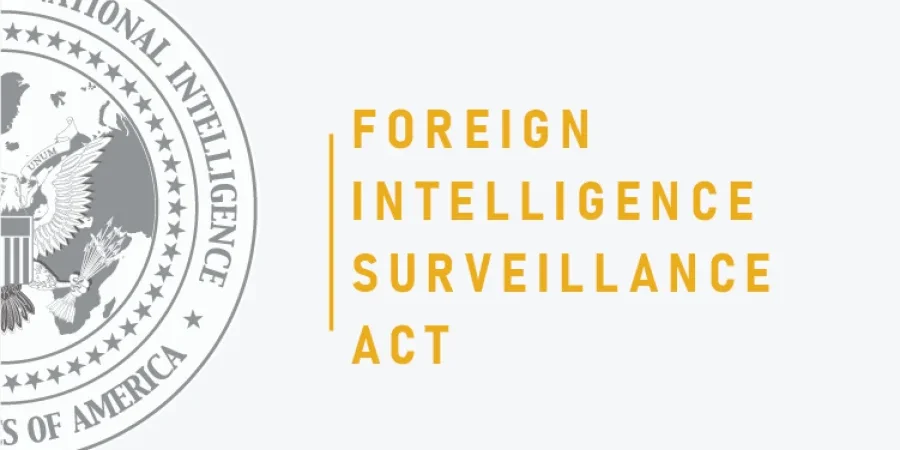The Reauthorization of Section 702 of the Foreign Intelligence Surveillance Act (FISA) was absolutely vital to our national security. Why then is every bout to renew this essential intelligence capability met with such contention? The answer is coupled in a fundamental misunderstanding how 702 works and concerns about previous abuses of it already no longer possible by policy – and now by law.
The loudest opponents of 702 often parrot talking points referring to FISA as a “warrantless spy tool on Americans”. The scare tactic bakes in – perhaps intentionally – a fundamental misunderstanding of the current 702 process and the incontrovertible value of this national security tool. Others reasonably seek to reform the query processes of the information collected, with greater transparencies and penalties for transgressions. Finally, previous FISA warrant applications have been laden with flimsy information that was not disclosed to the FISA judge. The intrusive abuses of Crossfire Hurricane immediately come to mind. These concerns are conceptually worthy of responsible discussion. However, these concerns are not worthy of discarding 702!
Proponents of 702, many of whom acknowledge the reasonable concerns, fundamentally balance in favor of Section 702’s vitality to national security. Moreover, proponents recognize this point in history requires our intelligence community (IC) have the ability to deploy robust tools to protect the homeland from foreign terrorist organizations and nefarious nation state actors. In this latest round of reauthorization, which was a slugfest, the proponents crafted a reauthorization bill including 56 key reforms that increased penalties and installed supervisory processes to abate some of the aforementioned concerns, and on April 20th President Biden extended FISA 702 with these new reforms included for two more years.
To better grasp the contentiousness of 702, it is critical to understand how basic FISA surveillance is deployed. As the namesake suggests, the initial targets of FISA surveillance are always foreign persons abroad. This capability does not draw serious objections at all. However, should a U.S. person communicate with a surveilled foreign person, those communications are captured and kept by the IC as well, even if entirely innocuous or mundane. After all, “communication” typically involves more than one person. For instance, imagine a member of Hamas under 702 surveillance contacts a U.S person, and that U.S person indicates a willingness to support Hamas. The “incidental collection” of the U.S. person’s communications can serve as actionable intelligence, but if the feds wanted to conduct electronic surveillance of that U.S. person they would have to apply for and obtain a separate probable cause-based order under FISA from a FISA judge to do so. It’s my experience that obtaining such a warrant is an incredibly high bar, held to a much higher standard of probable cause. The information gathered from the incidental collection could be used to build that probable cause. Moreover, if specific information about a terrorist attack were gathered regarding location or potential victims, the FBI could warn those potential victims of the threat. This is the virtue and utility of 702 in a nutshell.
Section 702 opponents root their objections in the retention of the incidental collection of overseas communications by the intelligence community, especially those innocuous communications with U.S. persons. The IC and the FBI maintain the ability to query those incidentally collected communications at any time, or what is aptly referred as a USPER query. The argument is that communications by U.S. persons were collected without a search warrant and thus violates the Fourth Amendment protections against unlawful searches and seizures. The same argument is made for queries of the incidental collection. Some would like to see additional warrant requirements for the query of incidental collections of data and communications. Some would impulsively abandon this capability altogether.
These arguments, while undoubtedly made with best intentions by most of those making them, have serious logical and constitutional flaws with his argument.
First of all, those suggesting the constitutional requirement for a warrant to query data and communications already in the possession of the U.S. government is incredulous. Should future versions of FISA hold such a requirement, then that would be a legal requirement…not a constitutional one. The government has already lawfully seized the information being queried under the original FISA process. The incidental collection of communications involving U.S. persons are already in the government’s possession. It would be a constitutional absurdity to require the U.S. government to get a warrant for data or communications already lawfully seized. In other words, no new information is being “seized” and thus Fourth Amendment protections could not possibly be triggered. To illustrate, would it make sense to have the ATF get a warrant to collect the firearms seized in a drug bust by the DEA? Of course not. And in matters of national security, it seems illogical to erect barriers to obtaining critical information that protects the homeland, especially when time is of the essence.
Abuse of the USPER queries have also been a great point of contention, and not without legitimate concern. An oft cited, yet intentionally misleading, example of “FISA abuse” is the claim by the most vocal opponents of FISA that FISA was used to spy on Americans 278,000 times in 2021 and 2022. In just a portion of 2022 alone, the FBI conducted approximately 120,000 USPER queries. The implication is that over a quarter-million Americans were spied upon by their own government. This, of course, is not true.
It is important to understand that those 278,000 USPER queries were NOT queries of 278,000 Americans, as has often been repeated by too many elected officials and 702 critics. Most USPER queries involve the same person and query multiple identifiers, such as name, email, phone number, business name, address, IP address, and so on. In fact, less than 2% of all USPER queries actually produce a search result. In other words, over 98% of the time a USPER query intrudes upon NO American. It is important to realize that the FBI only has access to around 3% of all of the IC’s total 702 database, so the chances you will be caught up in a matter of international intrigue is infinitesimal. Even those who would mislead the American people have ceded their own vernacular and have begun referring to the 278,000 number as “abuses”, rather than the number of Americans “spied upon”. But the damage to the FBI and 702 had been done, which was likely the point. It even led to absurd calls to “defund the FBI”, which is Chapter 1 in the Book of Bad Ideas.
The latest reauthorization of FISA directly addresses the reasonable concerns of those in opposition. The latest iteration of FISA forces the FBI to disclose the sourcing of information used to support a probable cause affidavit and bans any media reporting from supporting probable cause. This makes the likelihood of another abomination like Crossfire Hurricane to ever occur again, even if someone as incorrigible as Jim Comey were to find their way to the 7th floor of the J. Edgar Hoover building. Moreover, the new FISA creates significant criminal penalties for those who would abuse the FISA warrant or collection processes. Added to the new FISA reauthorization is the requirement that any application to even begin the FISA process must be approved by senior leadership. It also bans political appointees (e.g., FBI Director or Attorney General) from initiating a FISA warrant process. Sorry Jim!
It is important to note that after the revelations concerning USPER queries were brought to light, the FBI Director Chris Wray responsibly installed reforms that mirrored much of what the latest iteration of FISA requires. In fact, some of the internal policies of the Bureau allow the FBI to quickly take personnel actions by those who would abuse the FISA process, something that has been an albatross in prior instances of abuse. FBI personnel not assigned to national security matters no longer have access to raw FISA data. The FBI created the Office of Internal Auditing with full oversight over FISA compliance. Finally, USPER queries require a specific factual basis that a search of 702 data will yield foreign intelligence information or evidence of a crime, all of which must be articulated and approved by FBI lawyers and/or senior leadership PRIOR to the performance of any USPER query. These reforms were so transformative that the Foreign Intelligence Surveillance Court praised the FBI for its compliance reforms. Director Wray has many critics. I am not one. In my opinion, Wray has paid the bar tab for former Director Jim Comey’s transgressions since Comey was fired.
Reasonable minds can disagree as to whether the current version of FISA has gone too far in hamstringing the IC or does not go far enough. Advocates for greater FISA transparency and severe consequences for those who abuse FISA are reasonable and would have liked the recent reauthorization to go a bit further. That is a legitimate debate over 702 and has been healthy for both our national security apparatus and the national debate surrounding the tool. But what I hope we all can agree upon is that our nation does not need fewer tools in the intelligence toolbox, but rather our protective posture needs every agile enhancement imaginable. Wars rage in Ukraine and Israel. China continually threatens military action against Taiwan. Foreign terrorist organizations have reconstituted and pose a resurgent threat to the United States. Foreign cyber-attacks continue to escalate in sophistication and frequency, targeting our nation’s military readiness, critical infrastructure, and economic sectors. Our porous border has been crossed by unknown subjects looking to harm our homeland.
FISA 702 has saved countless lives, prevented countless attacks, and preserved countless freedoms…and it is quite possible you are unaware of all of those instances! The reauthorization process was arduous and contentious, but such was a small price to pay for those who won this bout, because the alternative threat to our national security is just too costly.
Jay Town is the Vice President & General Counsel at Gray Analytics, a defense contractor in Huntsville. He is the former U.S. Attorney for the Northern District of Alabama, career prosecutor, and United States Marine.













